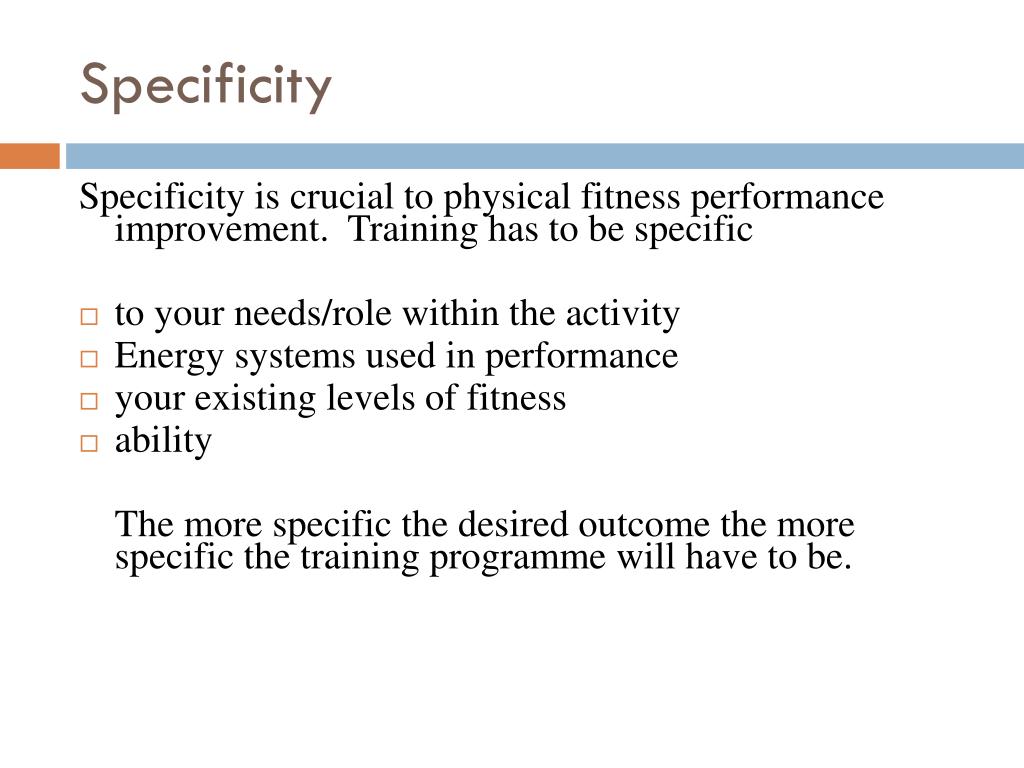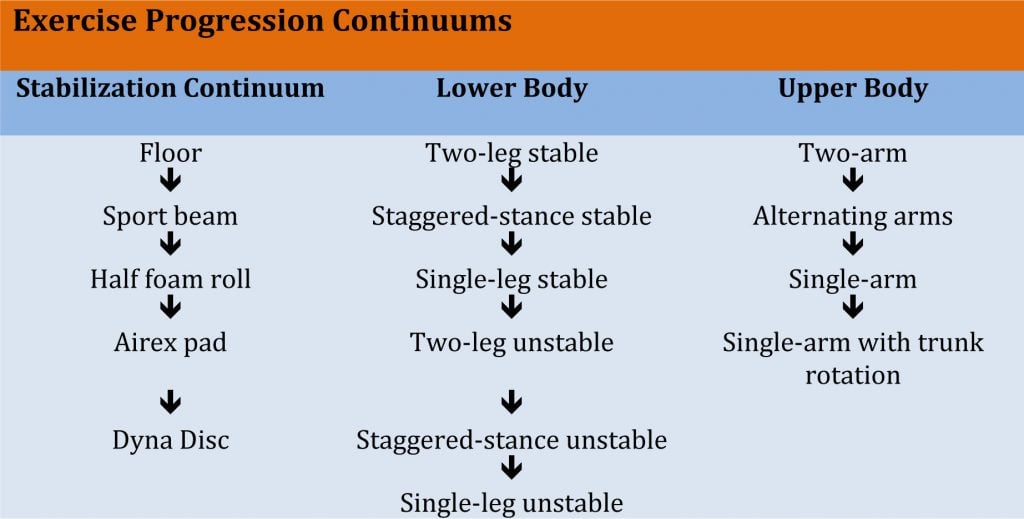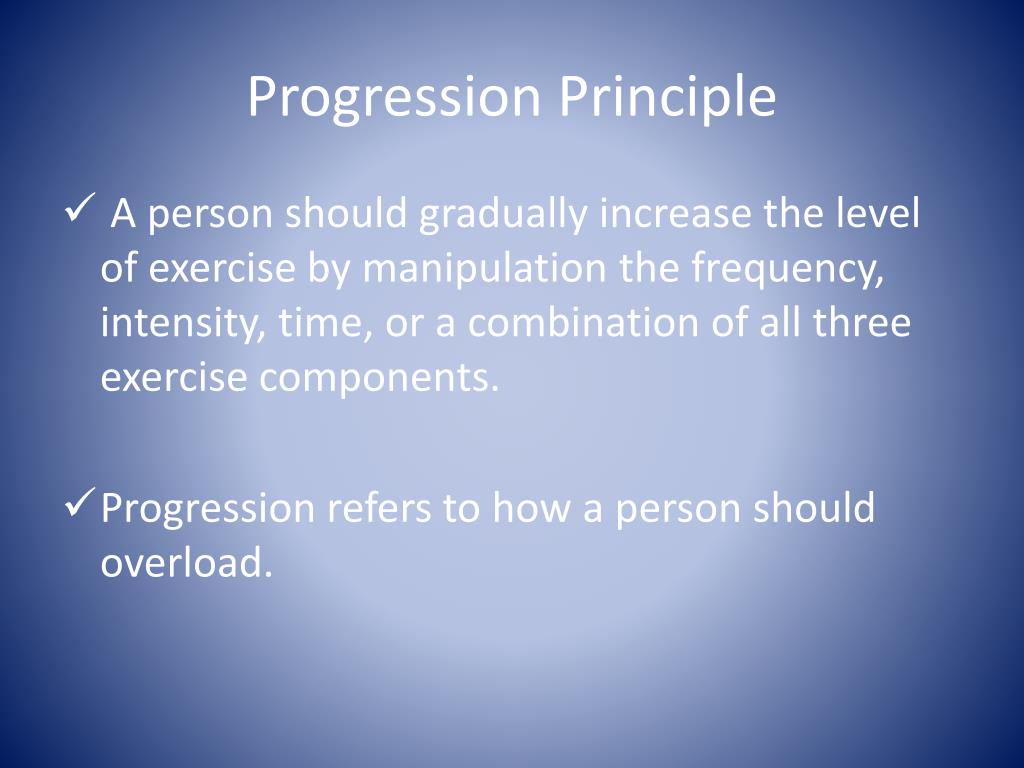

For example, if you are developing your muscular endurance and do the same circuit over and over again, you will get bored, lose motivation and not give 100% in sessions.

Your development plan must include variety to ensure you do not get bored and lose motivation. When returning, take this into account and set your sessions at the appropriate level to build you back up.For example, if you get injured during your agility development plan and miss three sessions, your agility levels will begin to reverse. These five principles are: The Overload Principle The F.I.T.T.You need to be aware that should you stop training due to injury, illness or boredom, your gains will reverse and you will gradually return to your starting ability. This principle complements progression and shows how you can make sessions tougher by referring to FIT : you should, where necessary, increase the: For example, if you are developing your CRE and find 20 minutes continuous training too easy, you need to make the next session tougher.This will ensure you do not hit a plateau. This principle emphasizes the gradual increase in the intensity, duration, or frequency of exercise to continually challenge and stimulate the body for ongoing improvement. Simply put, it says that you have to gradually increase the intensity, duration. Your development plan needs to become gradually more challenging in line with your development. One fundamental principle that lies at the core of effective training is the principle of progression fitness. The overload principle is one of the seven big laws of fitness and training. A gradual and systematic increase of the workload over a period of time will result in improvements in fitness without risk of injury. For example, if your weakness is lower body strength, you would include weight training that targets the legs and compound exercises such as squats. The principle of progression implies that there is an optimal level of overload that should be achieved, and an optimal time frame for this overload to occur.Your development plan needs to be specific to your performance levels and activity.

The principles of training can be embedded by following the SPORT acronym. When creating a development plan, guidelines can help ensure it is effective.įor example, the principles of training are a set of guidelines that help you when trying to develop any component of fitness from the physical factor. Study with Quizlet and memorize flashcards containing terms like What are the three components of the FITT acronym associated with overload and progression A. By tailoring our workouts to our individual goals, we can ensure that we are making the most efficient use of our time and effort.Having set a long-term goal for your development plan, you are now ready to create the plan. Similarly, if we want to build strength in a particular muscle group, we should perform exercises that target those specific muscles. For example, if we want to improve our cardiovascular endurance, we should engage in activities like running, swimming, or cycling, which challenge our heart and lungs. In other words, if we want to improve in a particular area, we must focus our training on exercises that target that specific area. The principle of specificity emphasizes that the adaptations our bodies make in response to exercise are specific to the type of exercise we perform. SPORT Specificity - sport and individual needs Progression - start at your level and gradually increase Overload - work harder than normal Reversibly. However, it's important to progress at a safe and appropriate rate to avoid injury or burnout.ģ. This depends on your fitness level and types of workouts you do. This means that we cannot simply maintain the same level of exercise and expect to see continued progress we must constantly challenge ourselves to do more. You can add progressive overload to your training routine in different ways.

The principle of progression states that as our bodies adapt to the increased demands of exercise, we must gradually and consistently increase the intensity, duration, or frequency of our workouts to continue seeing improvements. By doing so, our bodies will adapt and become stronger, more efficient, and better able to handle the increased demands placed upon them.Ģ. This means that we need to increase the intensity, duration, or frequency of our workouts to challenge our muscles, cardiovascular system, and other body systems. The principle of overload refers to the idea that in order to see improvements in our physical fitness, we must push our bodies beyond their current limits.


 0 kommentar(er)
0 kommentar(er)
